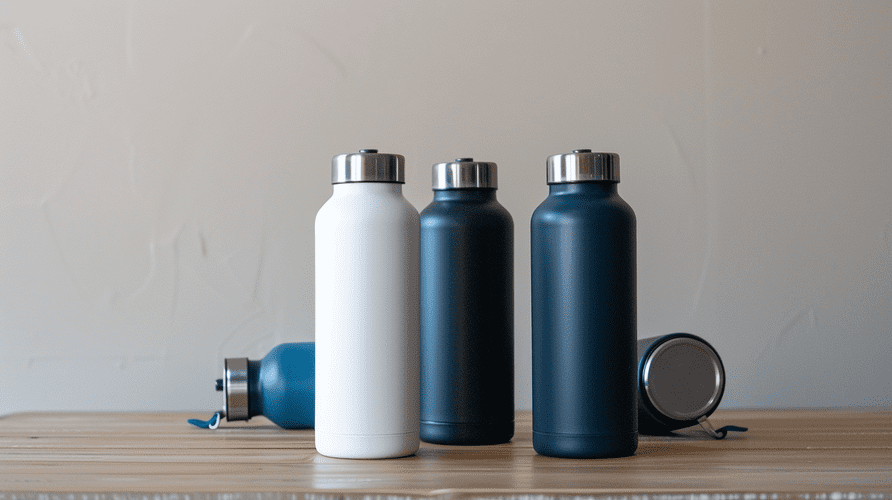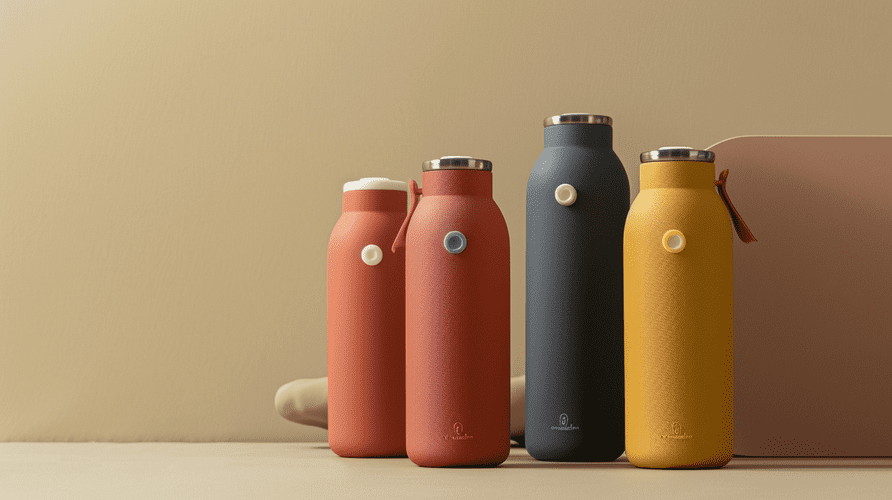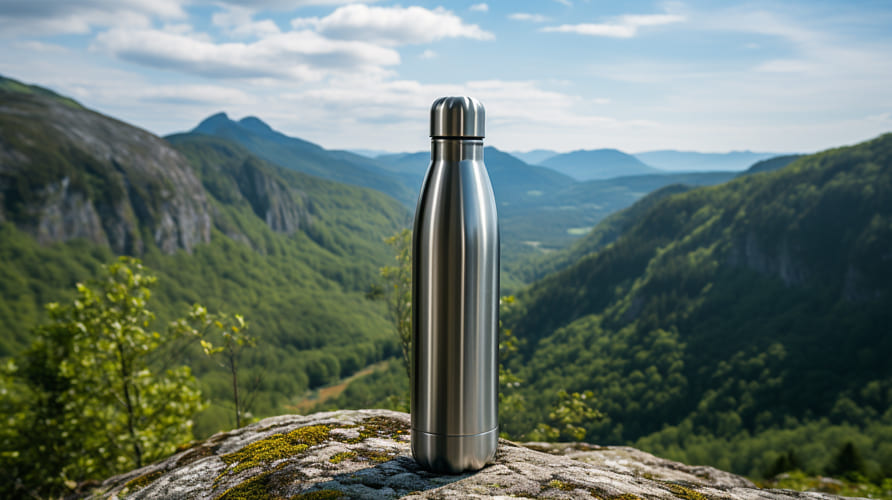Paying more for insulated bottles but unsure of the value? This confusion can impact your budget. Let’s see why they’re a smart investment for your business.
Insulated bottles cost more due to high-quality stainless steel and complex double-wall vacuum construction. Yes, they are worth it for superior temperature retention, durability, and brand image.

Now that we've touched on the main reasons for the price and value, you might have more specific questions. Many business buyers like you often ask these. Understanding these details will help you make the best choice for your company.
How long can I keep water in an insulated water bottle?
Worried if water stays fresh in insulated bottles for long periods? This is a common concern for many buyers. Good news: quality bottles maintain water quality very well when used correctly.
You can safely keep plain water in a clean insulated stainless steel bottle for 1-2 days. The vacuum insulation primarily maintains temperature, not sterility over many weeks.

When we talk about keeping water in an insulated bottle, a few things are important. I've dealt with many questions like this from B2B buyers. They want to assure their own customers about product use.
Material Matters: The Foundation of Freshness
First, the material of the bottle is very important. Our bottles at Icobottle use food-grade stainless steel1, often type 304. This steel is great because it does not react with water or other drinks. So, it will not give the water a strange metallic taste, even after a day or two. This non-reactive quality is a big advantage. Some plastics might release chemicals or smells over time. Stainless steel surfaces are also smooth. This makes them less likely to hold bacteria if you clean them properly. I always tell my clients, like Mark from Canada who values top quality, that this material choice is key for their customers.
The Role of Cleanliness: A Crucial Step
Second, how clean the bottle is makes a huge difference to water freshness. If you start with a very clean bottle, the water will naturally stay fresh longer. Any small bits of old drink, like coffee or juice, can make fresh water go bad faster. Even tiny bacteria from before can cause problems. So, washing the bottle well before each new fill is super important. This is a point I always make clear to my clients. It helps them guide their end-users.
Factors Influencing How Long Water Stays Good
Several things decide how long water stays good to drink in your insulated bottle.
| Factor | Impact on Freshness | My Advice for Your Business/Customers |
|---|---|---|
| Initial Bottle Cleanliness | High. Bacteria can grow if the bottle is dirty. | Always recommend thorough cleaning before refilling the bottle. |
| Water Purity | Medium. Tap water versus filtered or bottled. | Using filtered or bottled water might keep freshness a bit longer. |
| Additives (e.g., fruit, tea) | High. Sugars or organics speed up spoilage. | Advise drinking beverages with additives within hours, not days. |
| Lid Seal Integrity | Medium. A good seal stops outside dirt. | Ensure the lid is closed tightly. This creates a good barrier. |
| Ambient Temperature | Low. The bottle insulates well. | The bottle's insulation helps a lot. But start with cool water if possible. |
So, for plain water in a clean, good quality insulated bottle, keeping it for 24 to 48 hours is usually fine. If you add fruit, lemon, or sugar, you should plan to drink it much sooner. Ideally, drink it the same day. This avoids fermentation or spoilage. The insulation mainly keeps the temperature. It does not make water last longer than these general guidelines for safe drinking water.
How often should I clean my insulated water bottle?
Not sure how often to clean those insulated bottles? It is very important for hygiene. Let's look at the best way to keep them clean and safe for your customers.
Ideally, rinse your insulated bottle daily if you only use it for water. Wash it thoroughly with soap after every use if you put other drinks in it. Deep clean it weekly.

Keeping insulated bottles clean is a top concern for many of my clients. This is especially true for those who focus on quality, like Mark. He knows his customers expect high standards. Luckily, it's simpler than you might think.
Daily Use with Water
If you only use your bottle for plain water, things are quite easy. I tell my customers to give it a good rinse with hot water at the end of each day. After rinsing, let it air dry completely. Make sure the lid is off while it dries. This simple step stops any damp smells from developing. It also helps prevent any potential mold growth from leftover moisture. This daily habit makes a big difference in maintaining a fresh bottle.
After Other Beverages
Now, if you put coffee, tea, juice, or sugary drinks in your bottle, you need to be more careful. These drinks can leave residues inside the bottle. These residues can cause bacteria to grow. They can also create bad smells or affect the taste of future drinks. So, you must wash the bottle thoroughly with warm, soapy water. Do this as soon as possible after you finish the drink. I recommend using a bottle brush2. A brush helps you scrub the inside surfaces and the bottom properly. This removes all traces of the beverage.
Weekly Deep Cleaning Routine
Even with daily cleaning, a weekly deep clean3 is a very good idea. This helps remove any stubborn buildup or invisible films that regular washing might miss. It also helps to sanitize the bottle.
| Cleaning Step | Method | Why it's Important |
|---|---|---|
| Basic Daily Rinse (Water Only) | Hot water rinse, then air dry with lid off. | Prevents immediate odor and keeps it fresh for water. |
| Post-Beverage Wash | Warm soapy water, use a bottle brush for scrubbing. | Removes sugars, oils, and residues, preventing mold. |
| Weekly Deep Clean | Soak with vinegar/water or baking soda/water solution, then rinse. | Sanitizes, removes tough stains, and eliminates odors. |
For the weekly deep clean, you can make a simple solution. Mix equal parts white vinegar and water. Or, use a teaspoon of baking soda mixed with water. Fill the bottle with this solution. Let it soak for a few hours, or even overnight for a very thorough clean. After soaking, pour out the solution. Then, rinse the bottle very well with fresh water. Make sure no vinegar or baking soda taste remains. As always, let it air dry completely with the lid off. This routine keeps your bottles in top condition. They will stay fresh and hygienic for a long time.
Is it safe to drink water from insulated water bottle?
Worried if insulated bottles are truly safe for drinking? This is a valid concern for any business providing drinkware. Quality bottles are very safe, and I'll explain why.
Yes, it is very safe to drink from insulated bottles made of food-grade stainless steel. Common types are 18/8 or 304 stainless steel. This material is non-toxic and does not leach chemicals.

Safety is always the number one priority. This is especially true when we talk about products people use every day for drinking. I always assure my clients about the safety of our bottles. For example, Mark, my Canadian customer, is very careful about quality and safety certifications for his imports.
The Right Material: Food-Grade Stainless Steel
The main reason good insulated bottles are safe is the material they are made from. Reputable manufacturers, including us at Icobottle, use food-grade stainless steel. Most commonly, this is type 304 stainless steel4. You might also see it called 18/8 stainless steel. This name means it contains 18% chromium and 8% nickel. This specific composition makes the steel very resistant to rust and corrosion. It does not react with different types of drinks, like acidic juices or hot coffee. So, no harmful chemicals will get into your water or beverage. A very important point is that these stainless steel bottles are BPA-free5. BPA is a chemical found in some plastics that has raised health concerns. With stainless steel, you avoid that risk.
Why Stainless Steel is a Safe Choice for Drinkware
When you compare stainless steel to other materials used for bottles, its safety advantages are clear. As a procurement officer or business owner, this is good information for you.
| Feature | Stainless Steel (e.g., 304 grade) | Some Plastic Bottles | Unlined Aluminum Bottles |
|---|---|---|---|
| Chemical Leaching Risk | Very Low / None | Can leach BPA or phthalates | Can react with acidic drinks |
| Durability & Strength | High, resists dents and breaks | Medium / Low, can crack | Medium, can dent easily |
| Taste & Odor Neutrality | Excellent, does not retain flavors | Can retain odors and tastes | Can give a metallic taste |
| Cleaning & Hygiene | Easy to clean thoroughly | Can scratch, harbor bacteria | Needs careful cleaning |
This table shows why stainless steel is a preferred material for health-conscious consumers and responsible businesses.
What to Watch Out For
While quality stainless steel bottles are very safe, you should be careful with extremely cheap, unbranded ones. Sometimes, these products might use lower-grade materials. They could also have manufacturing defects that compromise safety or durability. I always advise my clients to work with trusted suppliers. These suppliers can provide information about the materials used and any safety certifications they have, like FDA or LFGB compliance. Also, if a bottle gets badly damaged, for instance, a deep dent that might break the inner wall (though rare), it is best to replace it. But generally, well-made insulated stainless steel bottles are built to last a long time and are built to be very safe for daily use.
Conclusion
Insulated bottles are a smart buy for your business. Their cost reflects quality materials and expert construction. This means safety, durability, and excellent performance for your brand and customers.
-
Explore the advantages of food-grade stainless steel, ensuring your water stays fresh and free from metallic tastes. ↩
-
Find out how a bottle brush can enhance your cleaning routine and help maintain your bottle's hygiene. ↩
-
Learn effective deep cleaning methods to ensure your insulated water bottle remains safe and odor-free. ↩
-
Discover the advantages of 304 stainless steel for durability and safety in your insulated bottles. ↩
-
Learn about the significance of BPA-free materials to ensure your health and safety when choosing drinkware. ↩

